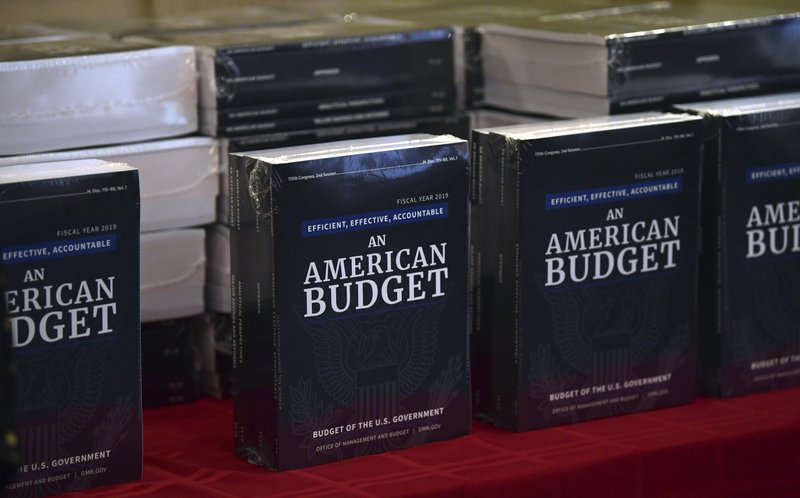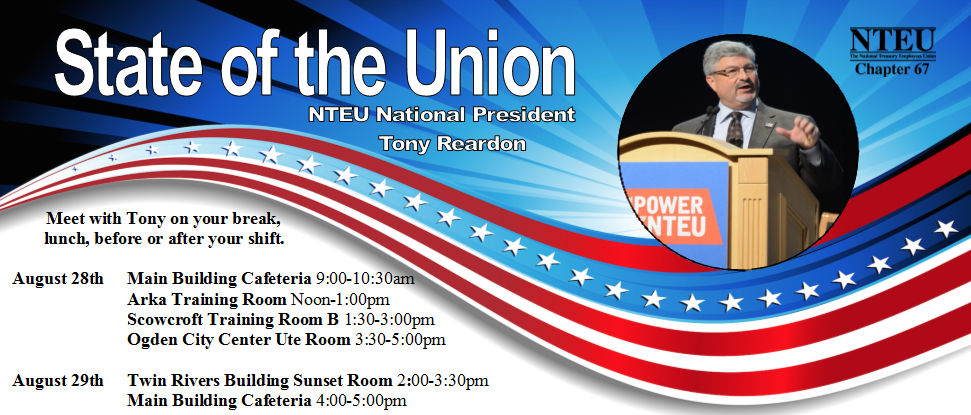RECENT NEWS:
* Please contact NTEU Chapter 67 at 801-620-6511 with any questions you may have.
NTEU Files Lawsuit Challenging Executive Orders
 06.5.2018
06.5.2018  Washington, D.C. – Today, the National Treasury Employees Union (NTEU) filed a lawsuit challenging provisions in two of the three executive orders issued a week ago by President Donald Trump.
Washington, D.C. – Today, the National Treasury Employees Union (NTEU) filed a lawsuit challenging provisions in two of the three executive orders issued a week ago by President Donald Trump.
“NTEU believes the president exceeded his authority in several provisions of his executive orders,” said NTEU National President Tony Reardon. “The president cannot unilaterally change federal law.”
Specifically, the NTEU suit challenges provisions in two of the three executive orders that conflict with the Civil Service Reform Act (CSRA).
The executive order relating to the use of official time by labor organization attempts to paint a picture, through rhetoric and misleading characterizations, that such time is not used for furthering the effective operations of a federal agency. In fact, the CSRA expressly provides that a union and an agency should negotiate for official time that is “reasonable, necessary and in the public interest.”
In the federal sector, such time allows employees to fight harassment, discrimination and unsafe working conditions. These are examples of situations that were resolved using official time and illustrate why representation for federal employees is critical:
-
Ensuring that deaf and hard of hearing and visually impaired employees have the equipment they need to perform their jobs as customer service representatives;
-
Securing time of protections for overworked Customs and Border Protection Officers, so that they can get needed rest to properly enforce border security and have time to spend with their families;
-
Negotiating and enforcing fair promotion procedures so that employees can fairly compete for advancement opportunities based on their qualifications, not other non-merit factors, like their relationship to or with someone, ensuring that federal agencies are not engaging in nepotism and that the public can be assured that those selected to implement our federal laws and programs are qualified;
-
Battling race and age discrimination in the federal workplace;
-
Challenging government efforts to intrude on employees’ privacy; and
-
Demanding that the government safeguard the personal information provided to it.
Despite the numerous ways the use of official time safeguards the nation’s federal civil service, the executive order attempts to place arbitrary limits on its use. Such a directive conflicts with Chapter 71 of the CSRA which allows for the negotiation of reasonable amounts of official time as negotiated between an agency and a labor organization.
“Official time ensures frontline employees have a safe place to go to report on the job harassment, discrimination, unfair retaliation and if they seek to disclose waste, fraud and abuse that is occurring internally at agencies,” Reardon said. “It provides a check and balance on agency leadership, allowing frontline workers to have the ability to seek accountability from agencies, and ensuring they operate in a legal, transparent and fair manner on behalf of the public in implementing and administering federal laws and programs.”
There is a second section in that same executive order that attempts to prohibit an employee on official time from speaking to their members of Congress to share their perspectives and ideas to improve workplace conditions and agency operations for the public.
“The law specifically gives federal employees the right to share their concerns and workplace perspectives with Congress, and any attempt to ban that flow of information cannot stand,” Reardon said.
The NTEU suit maintains that such a prohibition is contrary to Chapter 71 of the statute which permits unions to bargain for official time to direct their concerns directly to lawmakers.
In the executive order regarding the removal of federal employees, the president once again exceeded his authority in the provision calling for a performance improvement period of no more than 30 days. Chapter 43 of the CSRA requires a reasonable period for an employee to improve, and the length of that period is tied to the type of job and the nature of the alleged poor performance involved.
“The idea that these executive orders will make the workforce more efficient, cost-effective to taxpayers and improve the morale of federal employees is absurd,” President Reardon said. “Any organization’s success is dependent on a workplace where employees feel valued and respected, and the president’s orders show that in his administration federal workers are neither.”
NTEU’s lawsuit was filed in the U.S. District Court for the Eastern District of Virginia and asks the court to declare these portions of the orders unlawful and to enjoin the president and his subordinates, including the Director of the Office of Personnel Management, from enforcing them.
NTEU represents 150,000 employees at 32 federal agencies and departments.
Source: www.NTEU.org
Three Executive Orders Attack Federal Employees and Federal Unions
 05.27.2018
05.27.2018 
Three Executive Orders Attack Federal Employees and Federal Unions
|
Friday the administration made clear its animosity toward federal employees and our union. The president signed three executive orders aimed at reducing the role of federal employee unions, as well as the labor and due process rights of individual federal employees, including changes to official time, union offices and the disciplinary process. Through these executive orders, the administration has sent its strongest signal yet that it believes federal employees are dispensable and that your access to union representation should be greatly diminished. NTEU is thoroughly analyzing each executive order for its adherence to federal law and our contracts. It is important for you to know that an executive order can’t supersede a statutory obligation or collective bargaining agreement. In a sign of its disregard for employees and their representatives, the administration conducted a perfunctory "briefing" with NTEU and other unions at 5:15 p.m., on Friday afternoon but did not release the actual orders until nearly 6:30 p.m. In the meantime, it had released an inflammatory fact sheet to the media several hours earlier. National President Tony Reardon released the following statement to the media Friday afternoon:
As our analysis continues and we consider all our options—legal and congressional—be assured that NTEU is still on your side fighting for your rights. Nothing in these executive orders changes that. More information will be shared as it becomes available. www.NTEU.org -- Everyone is encouraged to register to vote and reach out to their representative in Congress. Let them know what you think about these particular executive orders and the administrations budget proposals for 2018. Get matched up with your Representative on key issues to federal employees at: NTEU Action Center |
FEVS is Coming Your Chance to Share Your Opinions
 04.11.2018
04.11.2018
|
President’s Budget Proposal Threatens Federal Employees and Undermines Civil Service
 02.27.2018
02.27.2018  Washington, D.C. – Federal employees reading the administration’s budget proposal would not recognize themselves in the misleading description of workers who should be paid less, while paying more for their benefits and retirement.
Washington, D.C. – Federal employees reading the administration’s budget proposal would not recognize themselves in the misleading description of workers who should be paid less, while paying more for their benefits and retirement.
“This document grossly distorts the current state of the federal workforce. They are not overpaid and underworked; they are middle-class Americans dedicated to public service and supporting their families,” said Tony Reardon, National President of the National Treasury Employees Union. “I look forward to offering a fact-based rebuttal to these proposals, after which Congress and the American people will stand and defend our civil servants by giving them the tools and resources they need to do their jobs.”
The budget contains a familiar laundry list of anti-federal employee proposals: blocking an across the board raise in 2019; slowing an employee’s career progression; making workers pay more toward retirement, which shrinks paychecks; lowering pensions; diminishing the government’s share toward health insurance; cutting sick and annual leave; weakening due process protections; and cutting worker compensation benefits.
Blocking a modest pay adjustment in 2019, as called for in the regular economic analysis based on private-sector pay adjustments Congress relies upon, would make federal employees fall further behind their private sector counterparts and damage our government’s ability to recruit and retain skilled workers.
According to the Department of Labor’s Employment Cost Index, private industry wages have increased an average 10.4 percent over the last five years, while federal employees have risen 6.9 percent over the same time.
“Federal employees are not Washington insiders. They live in every state and U.S. territory, just trying to earn a living, pay their bills, and save for their senior years,” Reardon said. “Pay freezes only chase the best and brightest workers to the private sector, where many of them can earn significantly higher salaries and avoid the demoralizing attacks from elected officials.”
NTEU instead supports legislation giving federal workers a 3 percent adjustment in 2019.
Overall, the administration suggests that federal employees give up $68 billion over 10 years through cuts to their health and retirement benefits, which would be on top of the $200 billion already slashed since 2011.
“Why is it that after passing a massive tax cut for wealthy Americans, politicians go looking for savings on the backs of federal employees?” Reardon said.
The budget also contains alarming language, under the guise of maximizing employee performance, that would eliminate protections against unfairly removing federal employees from service.
“It is unfortunate that the president’s newfound affection for due process does not extend to all of the men and women who work for the federal government, not just those in the West Wing,” Reardon said.
It has become a common refrain in some quarters to claim that the General Schedule is outdated and lacking measures and flexibilities to reward performing federal employees and discipline or remove those who aren’t, Reardon said.
“In fact, the General Schedule has built-in provisions to reward good employees and deal with poor performers. The real problem is that federal managers are not trained in their use, or simply decide not to use them, or Congress has not provided agencies with the funding to do so,” he added. NTEU has long supported additional federal manager and supervisor training as a way to use these tools more effectively.
NTEU will oppose the budget’s call to dramatically reduce agency budgets and any reform that has as its stated goal a reduction in the size of the federal workforce. Many agencies, like the Internal Revenue Service and Customs and Border Protection, are already understaffed.
“They say a president’s budget is a statement of vision. If so, then this administration envisions a civil service that is based on political fealty, not merit; a weakened federal workforce; federal agencies that can’t keep up with taxpayer demands; and more and more taxpayer services being delivered by for-profit corporations, not public servants,” Reardon said.
NTEU represents 150,000 employees at 32 federal agencies and departments. [www.NTEU.org]
2018 Legislative Conference
 02.13.2018
02.13.2018 
NTEU members from across the country descended on Washington D.C. to meet face-to-face with our elected representatives.
Chapter 67's representatives went to talk to the Utah delegation regarding issues that affect all of us. Proper agency funding/staffing, increased pay and a secure retirement were among the topics discussed.
Our goal is to make everyone aware of the difficulties that federal employees face everyday and to provide a path forward.
While most of the Congressional aides or representives we met with seemed to understand the core issues, we will need to stay vigilant. The best way to do that is by speaking up and hold them accountable by voting.
Employees are proud Americans that are working to protect our citizens and institutions.




